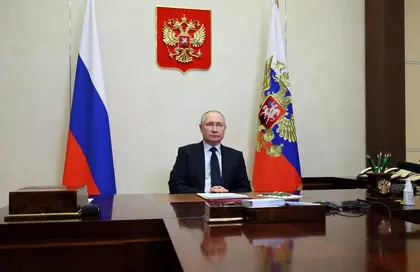Vladimir Putin has ordered his troops to seize the entirety of the Donetsk and Luhansk regions of Ukraine by March, a senior military intelligence official has told Kyiv Post.
Andriy Chernyak, a representative of the Main Intelligence Directorate of the Ukrainian Defense Ministry, said there are already signs that Russia is preparing for a renewed push to take the Donbas region in the east of the country.
“We’ve observed that the Russian occupation forces are redeploying additional assault groups, units, weapons, and military equipment to the east,” he told Kyiv Post. “According to the military intelligence of Ukraine, Putin gave the order to seize of the territories of Donetsk and Luhansk regions by March.”
After failing to take Kyiv as envisaged in its original plan for the occupying Ukraine, the Kremlin has radically scaled down its objective for the war as the takeover of the Donetsk and Luhansk regions which it has partially occupied since 2014.
In an interview with Kyiv Post this week, the adviser to the head of the President’s Office Mykhailo Podolyak, said he believes the offensive in Donbas has already begun, and that Russia may take more extensive action in the spring.
“It is clear that there will be some active measures in the spring,” he said. “However, even today, we are already seeing such actions in the Luhansk and Donetsk directions. That is, the (Russian) offensive is underway.”

N. Korean Troops Massed in Russia to Enter Ukraine War ’Soon’: Pentagon Chief
Yet Russia’s track record over the past 11 months of war has been one of failure after failure and Ukrainian sources doubt if the latest objective is achievable.
Captain Victor Tregubov of the Ukrainian Armed Forces told Kyiv Post that Putin’s order is unrealistic.
“There is information that Putin gave the order to capture Donetsk Region by Feb. 24, but that is impossible.
“After capturing Bakhmut, the Russian army would have to advance a considerable distance and would face problems with communications and supplies.” he said.
Internationally, there has been alarm at what Russia might be planning in order to be able to report battlefield successes to its people ahead of the one-year anniversary of the full-scale attack on Feb. 24.
On Jan. 30, NATO Secretary General Jens Stoltenberg said in a speech the CHEY Institute for Advanced Study in Seoul that Russia will launch a new offensive to control all of Ukraine.
“We see that they (Russians) are preparing for more war, that they are mobilizing more soldiers, more than 200,000, and potentially even more than that,” he said.
“That they are actively acquiring new weapons, more ammunition, ramping up their own production, but also acquiring more weapons from other authoritarian states like Iran and North Korea. And most of all, we have seen no sign that President Putin has changed his overall goal of this invasion that is to control a neighbor, to control Ukraine. So as long as this is the case, we need to be prepared for long haul.”
A Russian push to capture all of Ukraine would likely require a land invasion toward Kyiv from the territory of Belarus.
Chernyak downplayed the possibility of this happening, telling Kyiv Post that while Russia is using the territory of Belarus to train mobilized soldiers, it will not have sufficient forces and means to launch a massive offensive against Ukraine from this direction in the coming weeks.
“As of today, there are no formed strike groups,” he said. “There is no threat of Belarus being involved in a full-scale invasion on the side of Russia against Ukraine.”
Yet even if no large-scale offensive is launched from Belarus, Ukraine will be forced to keep troops stationed there to counter any smaller action, diverting them away from the front lines in the east.
“This is also definitely a risk that we have to take into account,” Chernyak said.
You can also highlight the text and press Ctrl + Enter






